Contract review has long been a core part of legal practice. Traditionally, it required attorneys to spend hours manually reviewing every line of a document. But with the rise of AI, this once time-consuming task has been accelerated and enhanced by intelligent automation.
However, finding a reliable AI contract review tool today is harder than it looks. With flashy marketing campaigns, paid advertisements, and bold promises, it’s easy to feel like every platform claims to be “the best.” This creates a challenge for legal professionals who need honest insights—not just marketing fluff. So, which platforms actually deliver?
Below, you’ll find our review of 10 AI contract review tools, each evaluated for its best use case with unbiased, detailed feedback.
At Remote Attorneys, our business model centers on connecting law firms with remote legal professionals—not selling software.
We’re not sponsored by or affiliated with any of the tools mentioned. We don't earn from clicks, links, referrals, or commissions. There’s no financial incentive for us to favor one solution over another.
This independence allows us to provide objective insights into the strengths and limitations of today's AI contract review software—so you can confidently choose the right fit for your needs.
Our recommendations are not based on opinions or surface-level feature comparisons. Instead, they come from real user experiences. Here’s how we evaluated our selections:
The Remote Attorneys content team conducted a survey with attorneys from our network who currently support law firms across the U.S. These attorneys work in firms of all sizes—solo practices, small, medium, and large—and use AI contract review tools in their daily work.
Respondents shared feedback based on their hands-on experience of these platforms. Each tool was assessed using three simple criteria:
- Price-to-Value Ratio: We focused on tools that deliver real value for the cost.
- Ease of Use: We prioritized platforms with short learning curves and smooth integration into existing workflows.
- Specific Use Cases: We evaluated how well each tool performs for particular legal tasks.

Out of 146 respondents, almost half of the attorneys (46%) reported actively using AI contract review software. The tools that made our final list reflect experience-based feedback gathered from a series of targeted questions.
Okay to be practical and fair for every tool, we use categorization to show its best use, so here’s the top AI contract review software out there:
- Best overall: Spellbook
- Best for solo lawyers: ContractSafe
- Best for small teams: HyperStart
- Best for medium teams: Juro
- Best for large teams: Evisort
- Best Value for Money: Spellbook

1. Spellbook
Website: https://www.spellbook.legal/
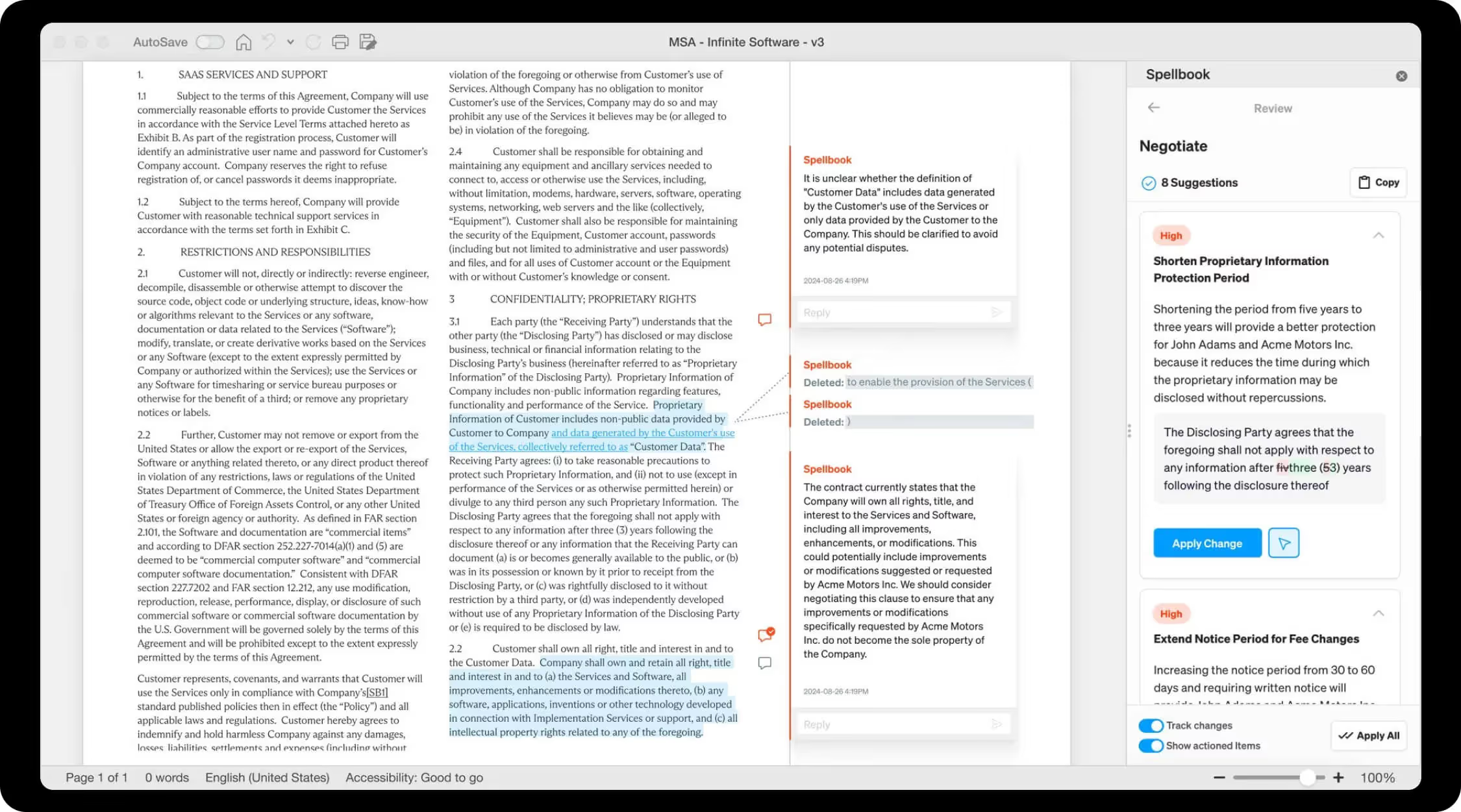
Spellbook is an AI-powered contract drafting and review tool that integrates directly with Microsoft Word. It uses OpenAI's GPT-4 technology to provide real-time legal assistance.
We ranked it #1 for its strong specialization in contract drafting and review, a feature highly valued by lawyers. In contrast, other tools on this list may include review functions, but they often feel generic as they focus more broadly on the entire contract lifecycle and try to balance a wider range of features.
Lawyers appreciate its seamless Microsoft Word integration, which allows them to work within the platform without switching tabs or leaving their document. It excels at identifying risky clauses, suggesting alternative language, and flagging missing provisions in real-time, making it feel like having another attorney reviewing the work alongside you.
Top Consideration: Requires Microsoft Word, which may limit its use for firms relying on other document platforms.
Best For: Legal professionals who primarily work in Microsoft Word and seek powerful AI support for drafting or reviewing legal documents without changing their existing workflow.
2. Evisort
Website: https://www.evisort.com/
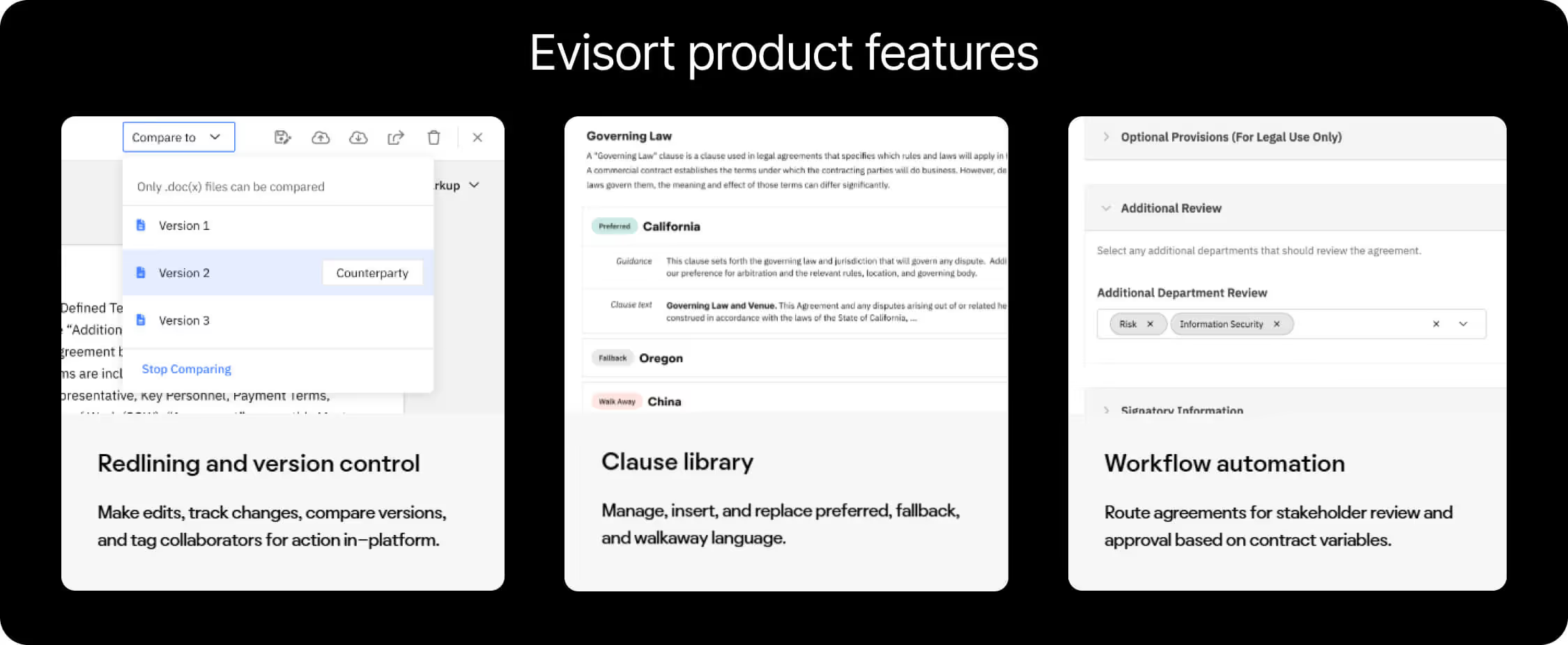
Evisort, founded by Jerry Ting, is a contract lifecycle management (CLM) platform that uses AI to analyze and optimize every stage of the contract process.
It's valuable for law firms worldwide due to its ability to process contracts in various formats and languages. Lawyers particularly appreciate its AI-powered data extraction, which can handle thousands of contracts quickly while maintaining a consistent level of accuracy.
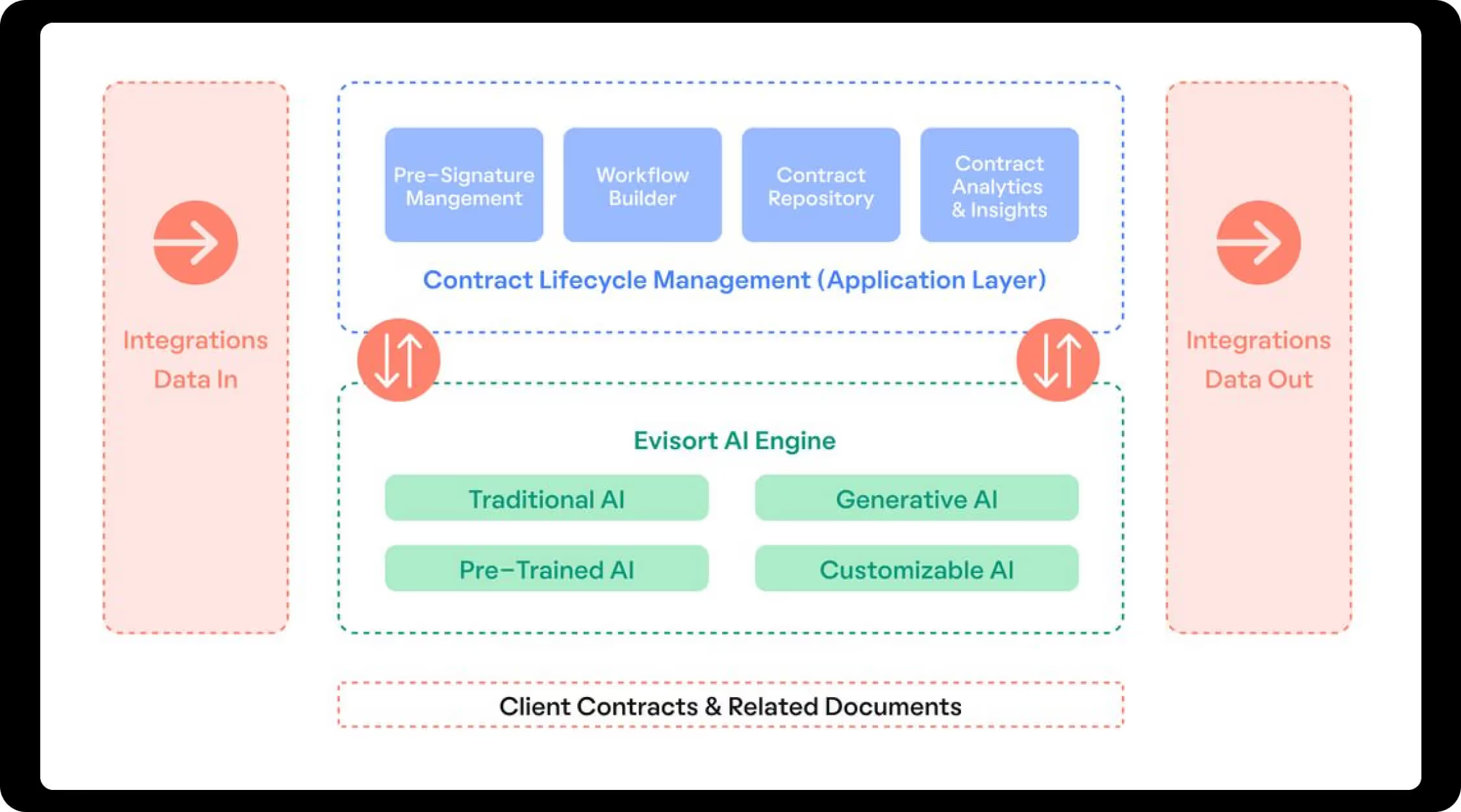
Top Consideration: May be too comprehensive for firms that only need specific functions like contract review.
Best For: Enterprises or large legal teams looking to modernize and automate the entire contract management process.
3. Luminance
Website: https://www.luminance.com/

Luminance is built on a proprietary legal Large Language Model (LLM) that automates the generation, negotiation, and review of contracts.
The platform is specifically designed for the legal industry and uses unsupervised machine learning to detect unusual patterns and risks in contracts, working in any language without needing extensive data training.
Top Consideration: New users may face a learning curve when navigating and using all available features.
Best For: In-house legal teams looking to reduce costs in contract review and negotiation without hiring additional counsel.
4. HyperStart
Website: https://www.hyperstart.com/
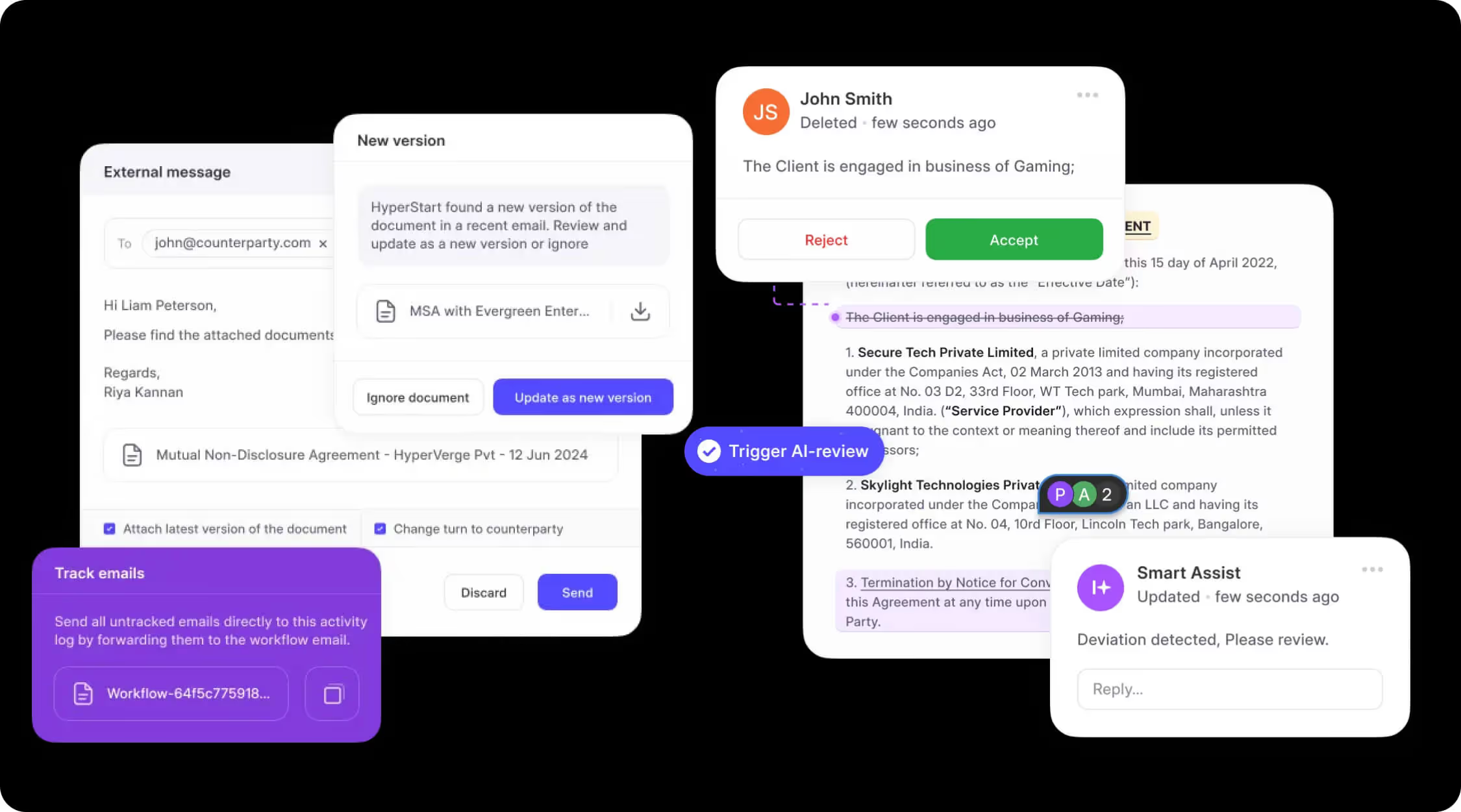
A company developed by HyperVerge, HyperStart applies AI expertise to deliver contract lifecycle management focused on usability and pricing flexibility. It ranks #4 thanks to its lawyer-friendly pricing, especially for small to medium teams.
Its AI capabilities for redlining contracts are notable, offering quick flagging of unusual provisions while providing educational explanations for less experienced practitioners.
Top Consideration: Review capabilities may be limited compared to enterprise-grade solutions.
Best For: Solo lawyers and small legal teams seeking advanced AI analysis for reviewing common contracts.
5. Ironclad
Website: https://ironcladapp.com/
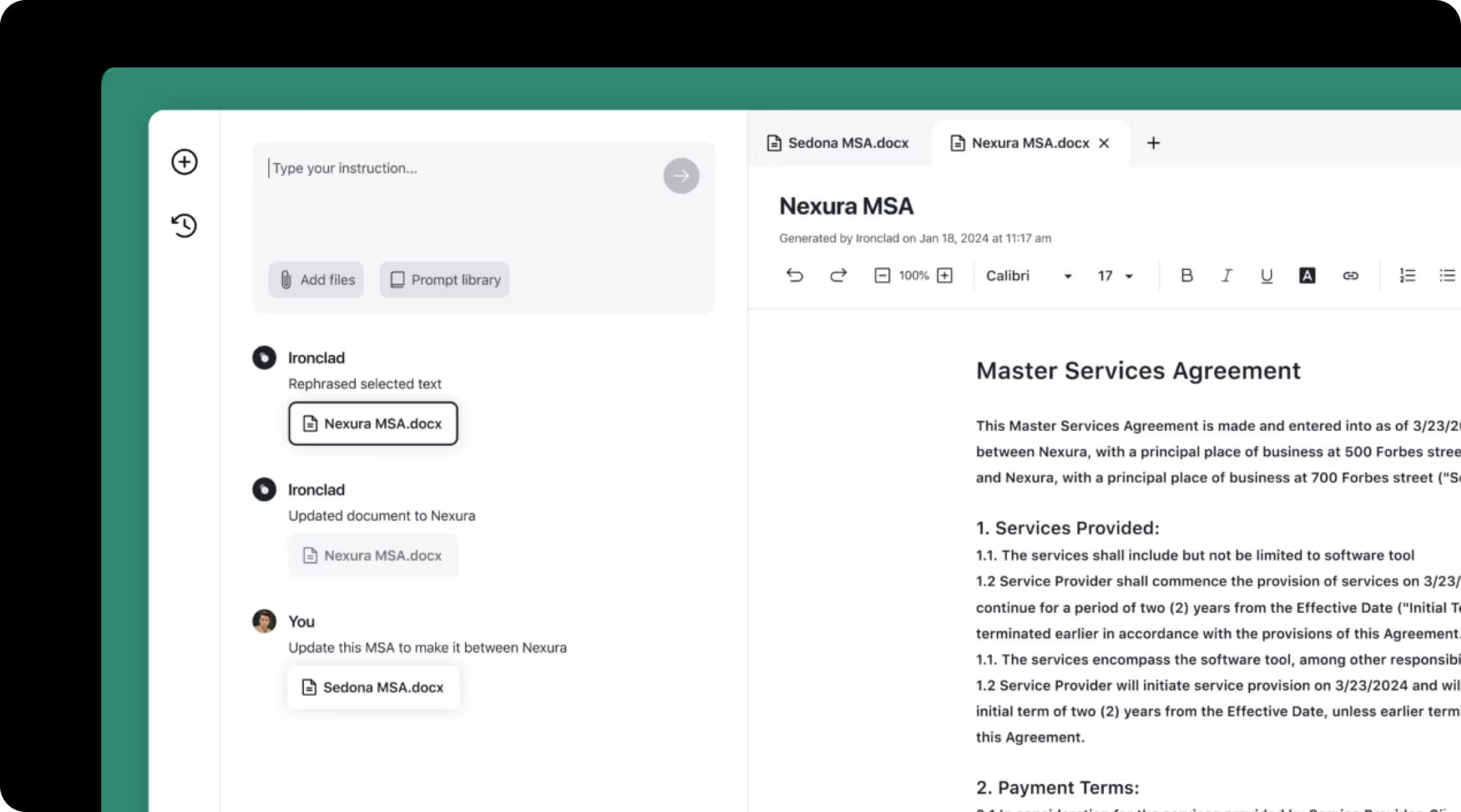
Ironclad is another notable contract lifecycle management platform, widely recognized for its AI-powered automation throughout the entire contract process. It provides a secure way to create, analyze, and collaborate on contracts.
In 2024, they introduced its latest innovation, a conversational AI legal assistant called Jurist, built on their open-source visual programming platform, Rivet.
Jurist offers advanced, legal-friendly features designed to handle large volumes of contracts. Its AI can automatically tag and index contract data, research recent legislation, and is complemented by workflow automation and a wide range of third-party integrations.
Top Consideration: The platform has restrictions on customization that can limit file format and metadata tracking.
Best For: Large teams seeking to automate and accelerate their entire contract workflow.
6. Juro
Website: https://juro.com/
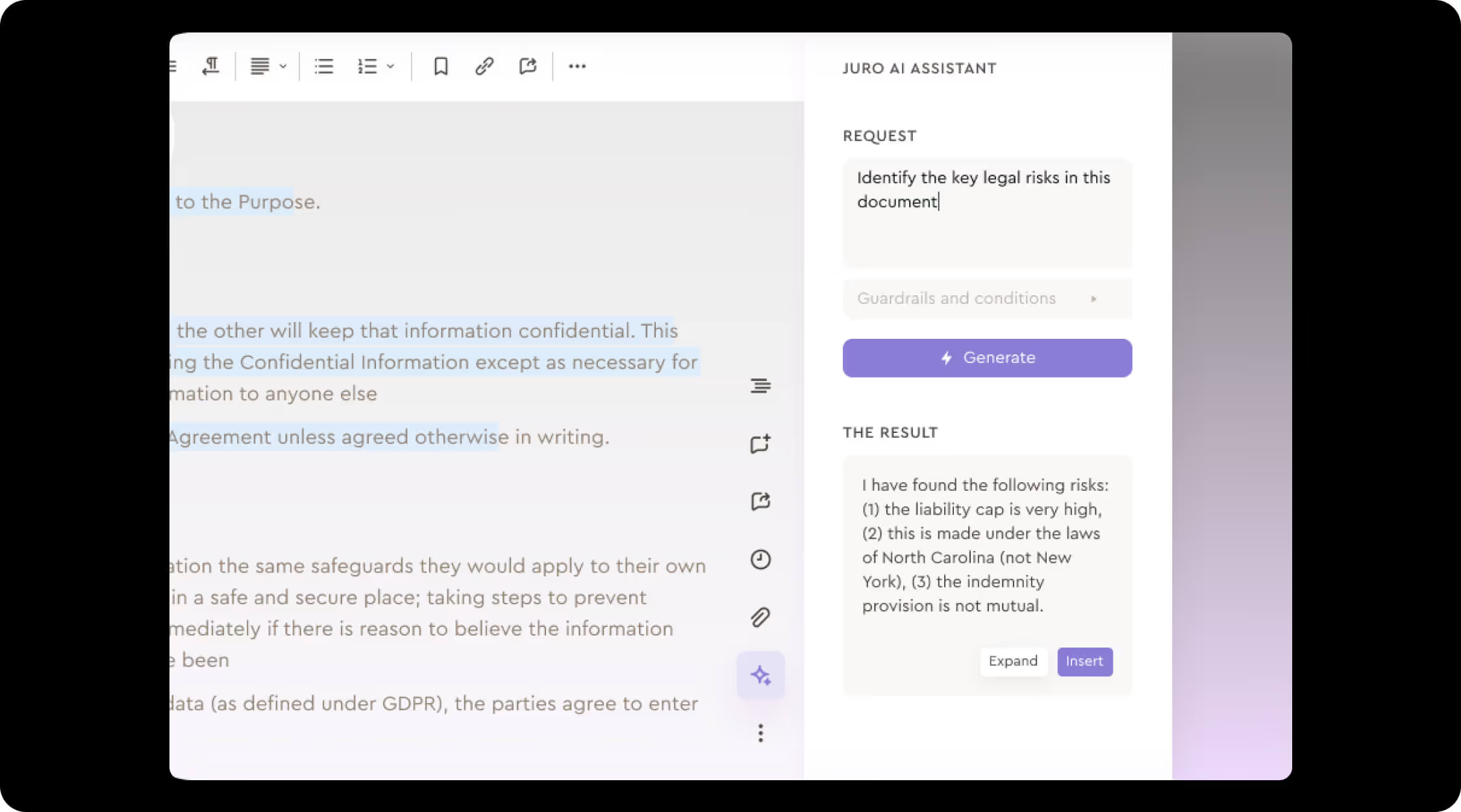
Juro is an all-in-one contract platform operating in a browser-based environment, featuring AI-powered review capabilities.
It allows teams to collaboratively review and redline contracts in real-time. Lawyers also praise its clean and intuitive interface.
Top Consideration: It may have limited customization options for workflows and dashboards. Some users have experienced slow performance when processing larger contract volumes.
Best For: Legal teams that need collaborative contract review with AI assistance, and those seeking automated updates for their clients.
7. ContractPodAI
Website: https://contractpodai.com/
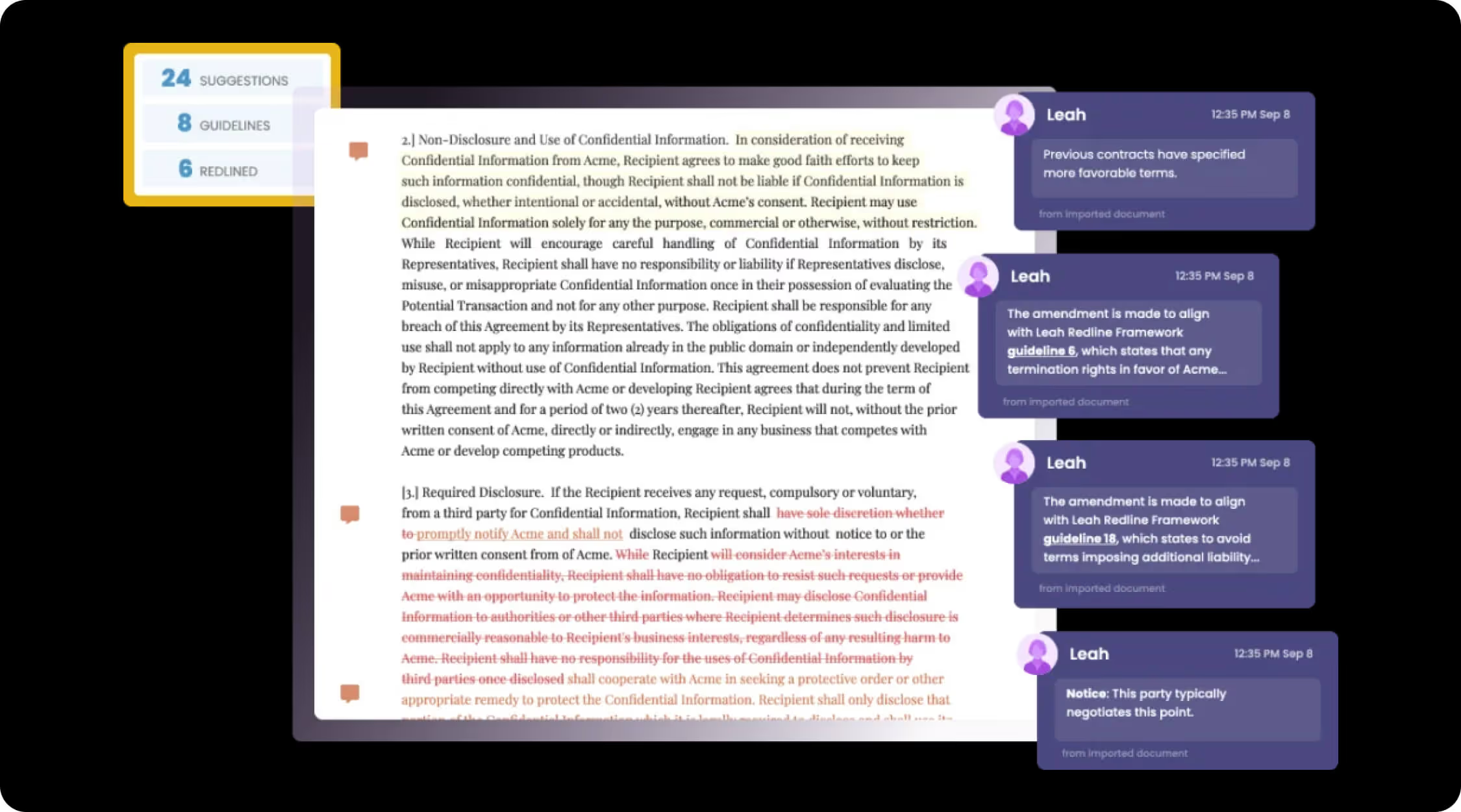
ContractPodAI is a CLM platform with a contract review feature powered by generative AI, designed specifically to assist legal teams and law firms.
It offers enterprise-grade AI contract review with advanced clause analysis and risk assessment for large-scale contract portfolios.
Top Consideration: Some lawyers have noted that although support is responsive, implementation can be complex and is not yet fully structured.
Best For: Legal teams handling complex legal agreements who want detailed analytics and reporting with customizable features.
8. Litera (Kira)
Website: https://www.litera.com/
%20review%20AI.avif)
Kira, acquired by Litera in August 2021, has made significant advancements in its contract review AI, which supports legal professionals in due diligence and other contract analysis tasks.
Its AI is trained by lawyers and can identify over 1,400 clause types and data points across more than 40 areas of law
Top Consideration: Its review process can be technical and may require specialized training to use effectively.
Best For: Law firms performing large-scale contract reviews that require expertise for due diligence and clause identification.
9. Robin
Website: https://www.robinai.com/

Robin specializes in legal AI that streamlines the complex review process for legal professionals.
Lawyers appreciate its negotiation-focused tools, which help identify terms to push back on and track position changes throughout negotiation cycles.
Top Consideration: Still a newer player in the market, so it may lack some features needed for handling highly complex agreements.
Best For: Legal professionals primarily focused on the review process for standard contracts.
10. ContractSafe
Website: https://www.contractsafe.com/
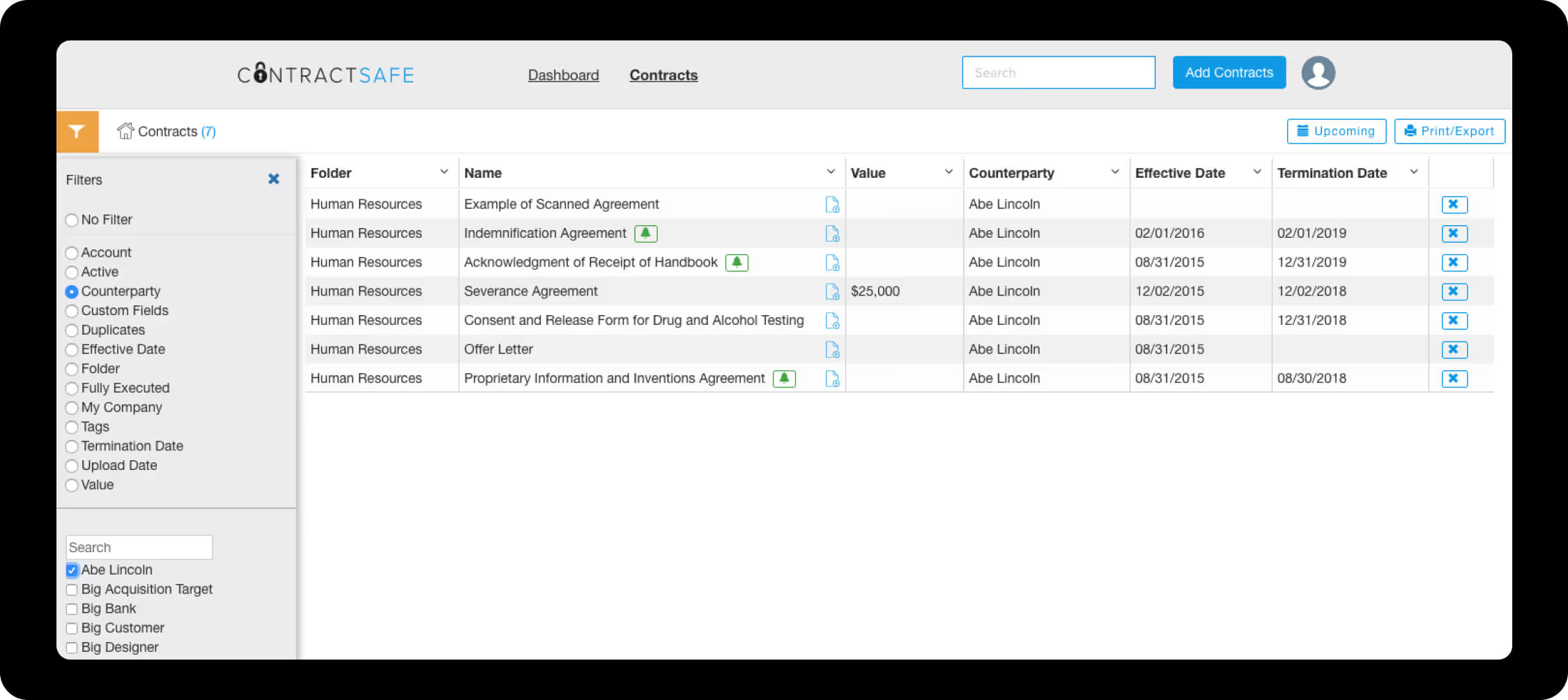
ContractSafe provides AI-powered contract review designed to make contract management software more affordable and accessible for legal teams.
The platform is user-friendly for non-technical users, and its customer support is frequently praised. Overall, it delivers solid functionality at a lower cost compared to other platforms.
Top Consideration: Its AI capabilities still need improvement, but the platform has strong potential with ongoing AI innovation.
Best For: Organizations looking for a quality, affordably priced platform with AI functionalities for contract review.
As for the pricing, all of the AI contract review tools listed use custom pricing. You’ll need to book a demo so they can tailor the pricing to your needs, including contract volume, team size, and budget.

AI contract review is the process of using artificial intelligence to review, evaluate, and analyze contracts. Platforms offering this capability use a mix of natural language processing (NLP), machine learning, and generative AI. These technologies allow AI systems to be trained like lawyers, understanding legal terminology and context, so they can automate and enhance every stage of the contract review process.
Yes, using AI for contract review is legal, and it's becoming an increasingly common practice in the legal industry. While AI continues to evolve and global regulations are still catching up, it’s important to understand the responsibilities and ethical considerations involved.
Here’s what you should consider:
- AI is a Tool, and not a Replacement: Legal professionals must understand the capabilities and limitations of AI. As stated by the Alabama State Bar, AI should never replace a lawyer’s professional judgment. While AI can accelerate workflows and improve efficiency, the final review and decisions must always remain in the hands of a qualified legal professional.
- Confidentiality: AI tools must adhere to attorney-client privilege and confidentiality standards. Some jurisdictions may require client consent before using AI in their legal matters. Always ensure the tool you use has proper security protocols and transparent data processing policies.
- Bias in Training Data: AI systems learn from their training data. If this data contains historical biases, such as in contract terms from specific legal areas, AI may reinforce or amplify those biases. Lawyers have an ethical obligation to verify AI tools’ findings for bias and ensure fairness.
AI can review legal contracts using natural language processing (NLP), machine learning, and pattern recognition to analyze and flag issues in legal documents.
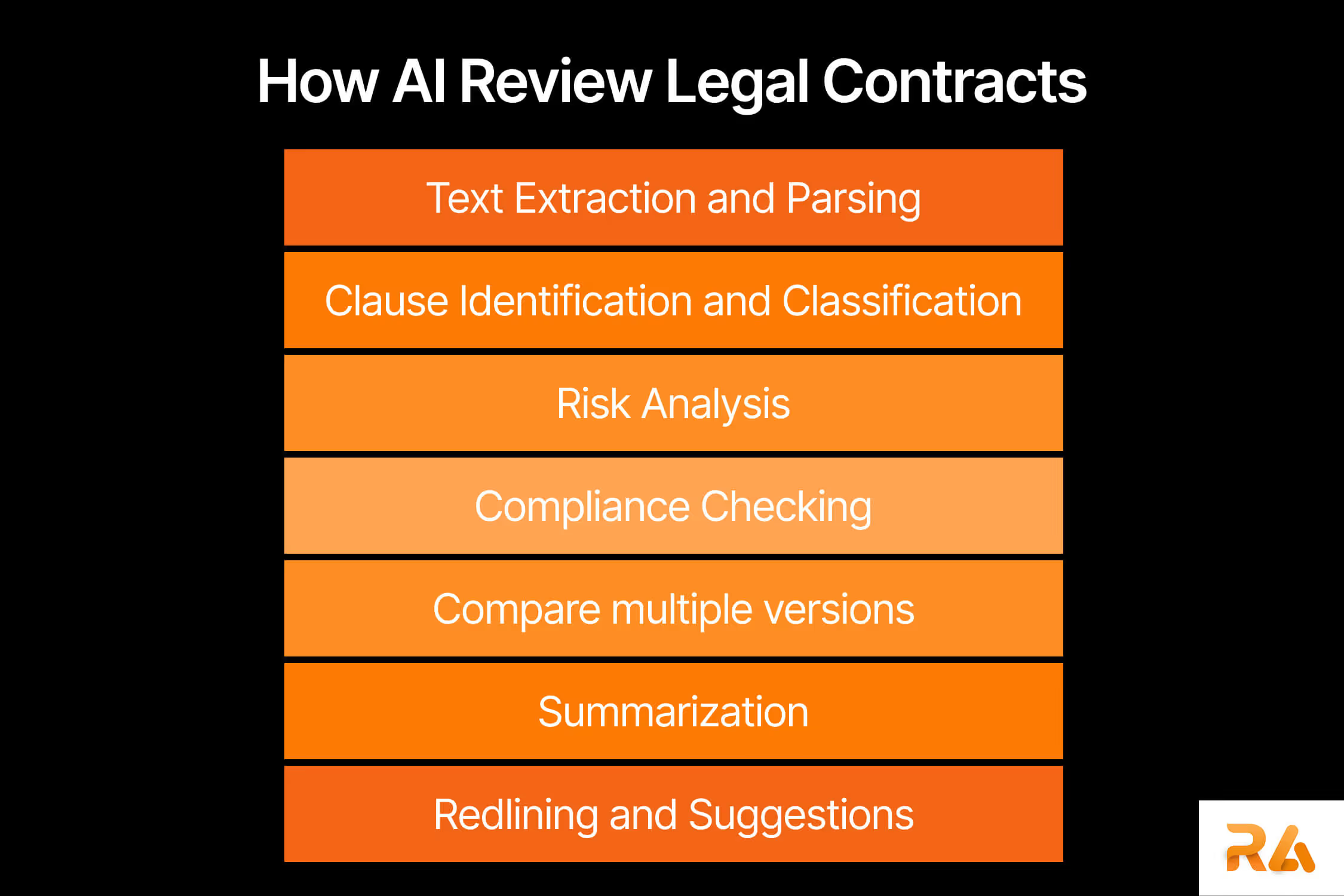
Here's how it works:
- Text Extraction and Parsing: AI tools quickly analyze and extract text from contracts, whether in PDF, scanned documents, or other formats. The system then parses the document to identify structure, clauses, terms, obligations, and other key data points from the documents.
- Clause Identification and Classification: AI detects clauses such as termination, liability, or payment terms by comparing them to a large database of contract templates. It then classifies them as standard, non-standard, or potentially risky based on predefined rules or learned patterns.
- Risk Analysis: AI assesses whether a contract aligns with industry standards. It flags potential issues like ambiguous language, missing clauses, or inconsistencies that deviate from best practices.
- Compliance Checking: AI cross-references contract terms with legal databases or regulatory frameworks to ensure compliance with applicable laws.
- Comparison: AI can compare different versions of a contract or similar agreements to identify unusual, risky, or unfavorable terms.
- Summarization: AI can generate summaries of lengthy legal documents, making it easier for legal teams to quickly review key points. For instance, a 300-page merger agreement could be condensed into a brief summary highlighting key provisions, obligations, and deadlines.
- Redlining and Suggestions: Some AI tools can automatically redline contracts, suggesting revisions, alternative wording, or fallback clauses based on approved legal playbooks.
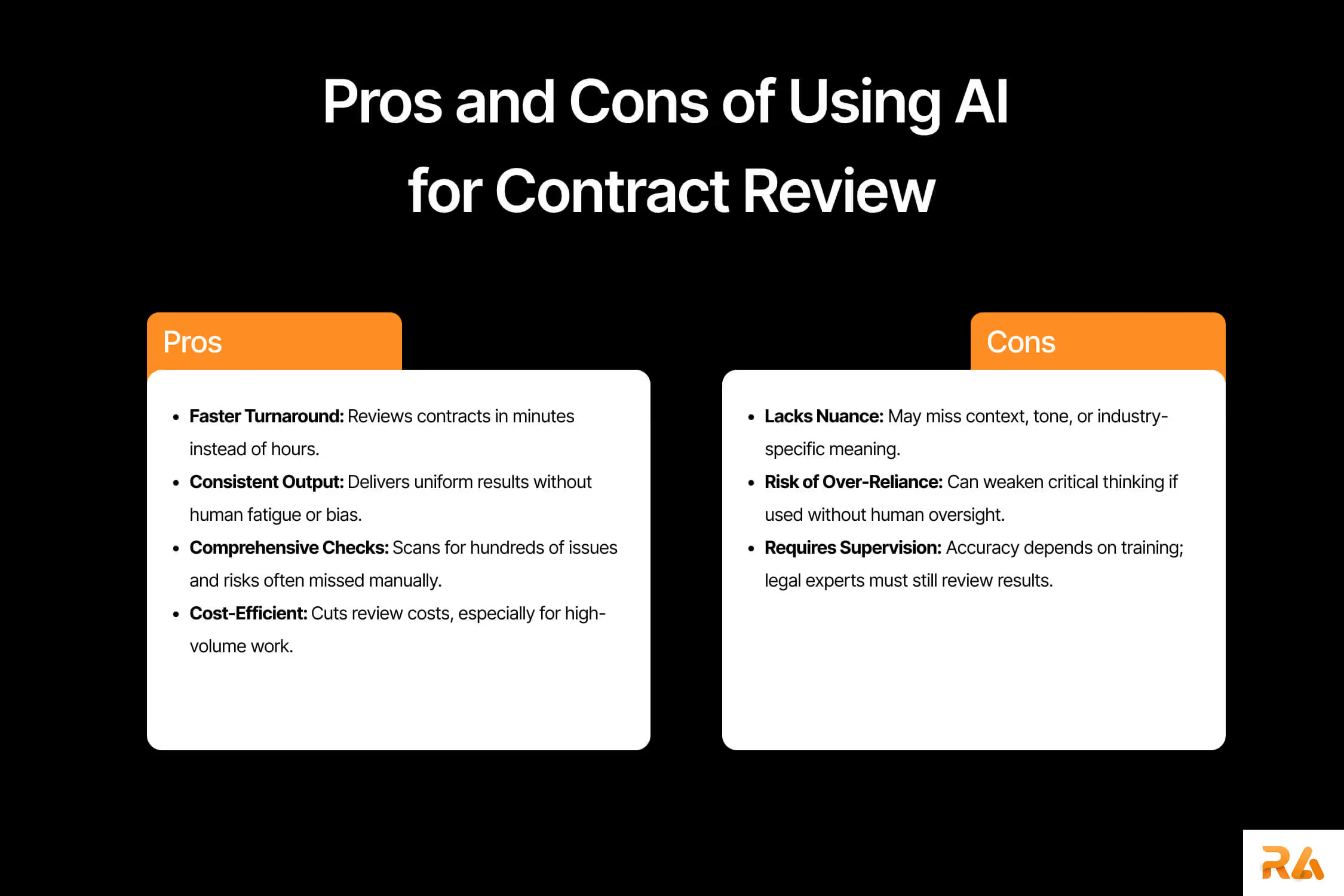
Advantages:
- Faster Review Process : AI reviews contracts in minutes, not hours, significantly speeding up turnaround time.
- Enhanced Consistency: Unlike human reviewers who may have varying attention levels or different interpretations due to fatigue, AI provides consistent analysis across all contracts.
- Deep Analysis: AI can simultaneously check for hundreds of issues, clause types, and risk factors from lengthy agreements that might be overlooked in manual review.
- Cost Savings: AI lowers review costs for high-volume tasks which improve profit margins for firms.
Disadvantages:
- Limited Contextual Understanding: AI may miss subtle nuances, intent, or industry-specific implications that a human lawyer would understand.
- Over-reliance Risk: Depending too much on AI could lead to reduced critical thinking or analytical skills among legal professionals that can compromise judgment in complex situations.
- Oversight Still Needed: The accuracy of AI depends on the quality and depth of its training data. Legal professionals must verify its outputs.
AI contract review software is a valuable asset for legal professionals and organizations, each benefiting in unique ways:
- Solo Practitioners: Gain access to powerful contract analysis tools that help them compete with larger firms without hiring additional staff.
- Small and Medium Law Firms: Efficiently handle routine contract review, enabling them to take on higher volume work and serve more clients.
- Large Law Firms: Use enterprise-grade AI to standardize review processes and manage extensive due diligence projects more efficiently.
- Corporate Legal Departments: Apply AI to manage contract portfolios, ensure policy compliance, and respond faster to internal business requests.
- Government Agencies: Use AI to review procurement and vendor contracts, helping enforce regulatory compliance across departments.
Whether we like it or not, AI is now part of our world—impacting the way we live, work, and interact. The legal industry is no exception. Let this sink in: as of 2024, nearly 30.2% of law firms are already using AI-based technology tools, and that number continues to grow.
AI is evolving faster than anyone anticipated, constantly learning in ways that go beyond human capabilities. While it comes with both advantages and limitations, the real question legal professionals should ask is whether AI can enhance their practice or accelerate their growth.
Based on our survey of 146 attorneys, 46% are already using AI to assist with contract review. We created this guide to help you make an informed decision, because we understand how difficult it is to choose the right tool. By learning from professionals who’ve already adopted these solutions, you can save time and money without testing every platform yourself.
AI is a powerful tool to support your contract review process, but it shouldn’t replace human judgment. In the end, the responsibility and final decision rest with you. Your success will still depend on realistic expectations and proper implementation.
Can AI Replace Contract Lawyers?
No. AI is built to assist and not replace contract lawyers. While it’s a powerful tool that enhances every stage of the contract review process, your legal expertise, oversight, and judgment are still essential that define your legal practice.

Can I use ChatGPT to review legal contracts?
While ChatGPT can be a beneficial tool for contract review, its limitations should be kept in mind, as it is not a tool designed specifically for the legal profession. For example, cases involving jurisdiction-specific terms and indemnity clauses require a professional legal understanding, which ChatGPT lacks due to its generalized training.
Does AI Improve Accuracy in Contract Review?
Yes, AI can improve accuracy in contract review by minimizing human error and inconsistency inherent in manual processes. While AI systems are still evolving and might show errors in complex or unusual situations, studies indicate that leading AI document review systems can achieve 90-95% accuracy rates for common contract elements, which is often comparable to, and in some cases even surpasses, the performance of human reviewers.

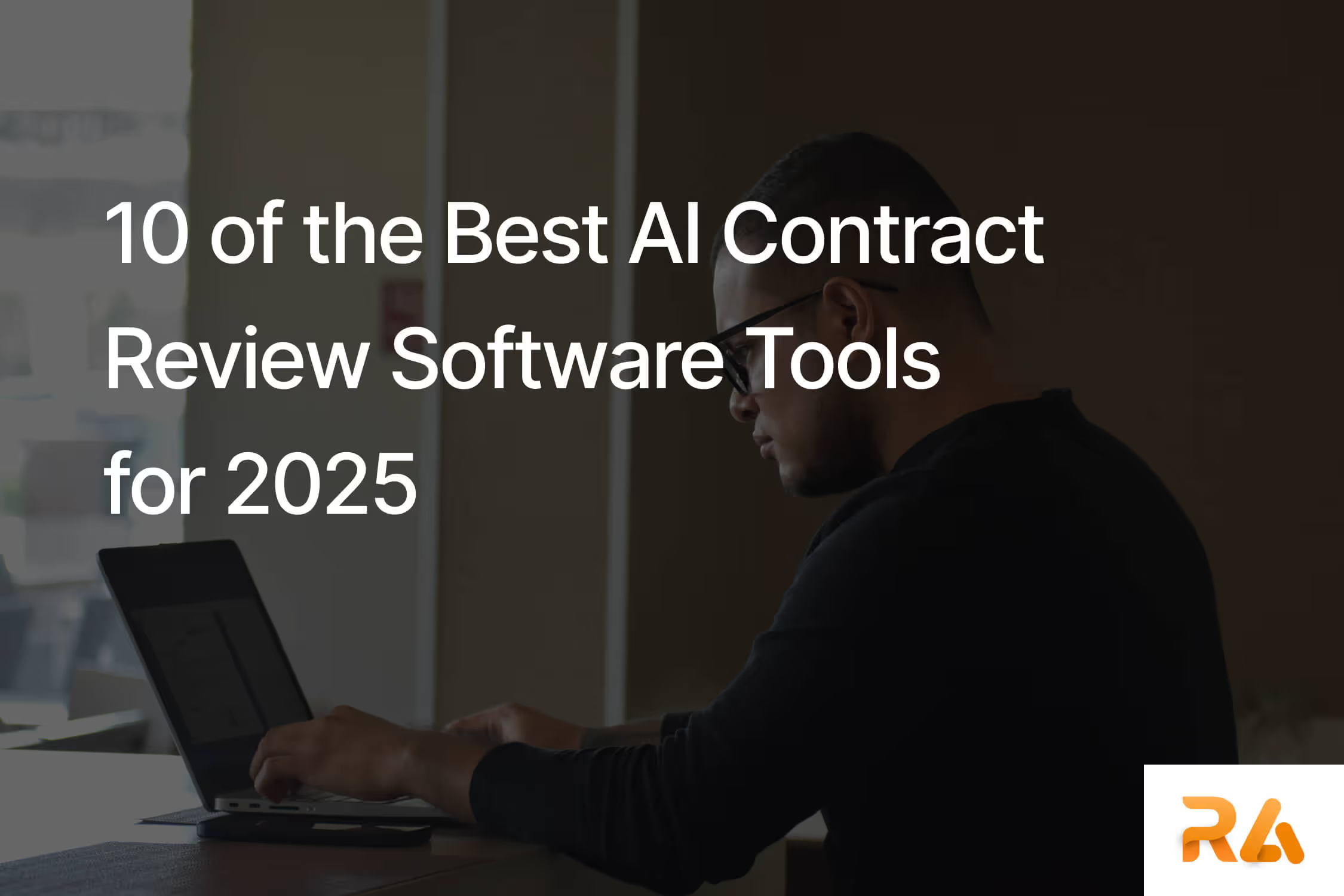

.webp)
.webp)